
17 Careers in Nutrition & Fitness to Consider (UK)
Explore 17 Careers that combine both Fitness and Nutrition
See the most popular types of careers in fitness and nutrition, their average salaries, career progression routes and what is needed to start a career within each respective job.
1. Career as a Personal Trainer
Average Salary: £33,000 per year (Average of salaried roles posted on Active Careers)
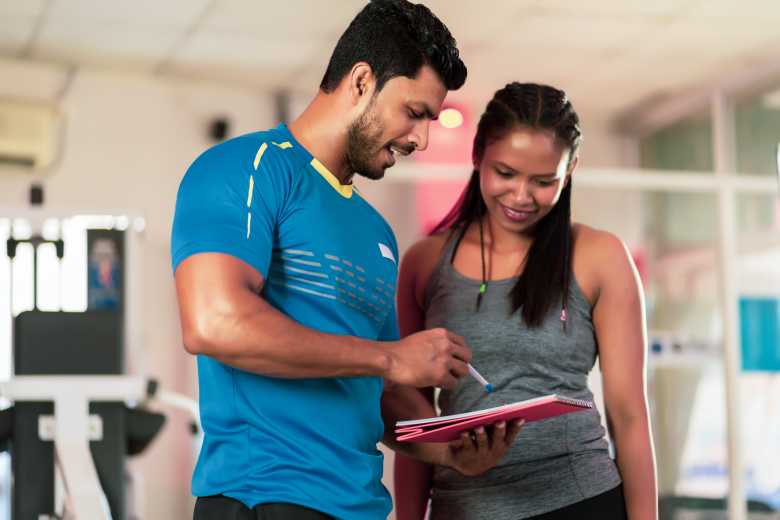
Number one on our list of careers related to nutrition and fitness is that of a Personal Trainer (PT).
Personal Trainers write customised training programmes and nutrition plans that are focused on helping clients reach their respective fitness and health objectives around their lifestyle and commitments.
You will create goals with clients, conduct client consultations, motivate clients them both in and out of sessions, as well as market your services.
There are a plethora of different ways and mediums you can deliver personal training such as using parks, clients homes, a gym setting or via online software.
A critical aspect to being a successful PT is that you will provide advice, guidance and plans on nutrition and supplementation tailored to clients training aims and goals.
You can either work as a Personal Trainer in a gym or studio based environment as a freelancer where you will run your business from the gym or as a paid employee where you generate income for the gym.
The limitations though are endless with job opportunities available with private medical care and event companies through to cruise ships and even the Police and the Ministry of Defence.
Progression Route: You can go onto become a gym manager for a National gym chain, PT Studio or Leisure Centre.
Qualifications Required: In order to operate as a Personal Trainer in the UK, you need to hold a Level 3 personal training certificate or diploma.
2. Work as a Registered Dietician
Average Salary: £37,000 per year (Average of salaried roles posted on Active Careers)

One of the highest paying jobs in nutrition and fitness is that of a dietician.
Dietician's apply nutritional science to enhance health and manage diseases and conditions by providing tailored, actionable guidance to clients, patients, caregivers, and peers.
They offer advice and support to individuals exploring dietary strategies, including elimination diets, nutritional supplements and offer dietary approaches for particular medical conditions.
Dieticians can work independently through setting up their own business, but are more commonly found working at clinics, private medical care companies, the NHS as well as working with high profile athletes and sports teams.
Progression Route: Most dieticians begin as an entry-level dietitian, but you can advance to a specialist dietician where you specialise in a certain nutritional jurisdiction or Dietetic Team Manager where you will be responsible for your own team and budget.
Qualifications Required: You will need a degree in dietetics at undergraduate level to qualify as a dietician and then in order to practice it is a legal requirement to register with register of dieticians.
Explore Active Career's range of jobs in Fitness
Active Careers has hundreds of live jobs from some of the UK's biggest employers within the fitness, health and sport sector
3. Pilates Instructor Jobs
Average Salary: £30,000 per year (Average of salaried roles posted on Active Careers)
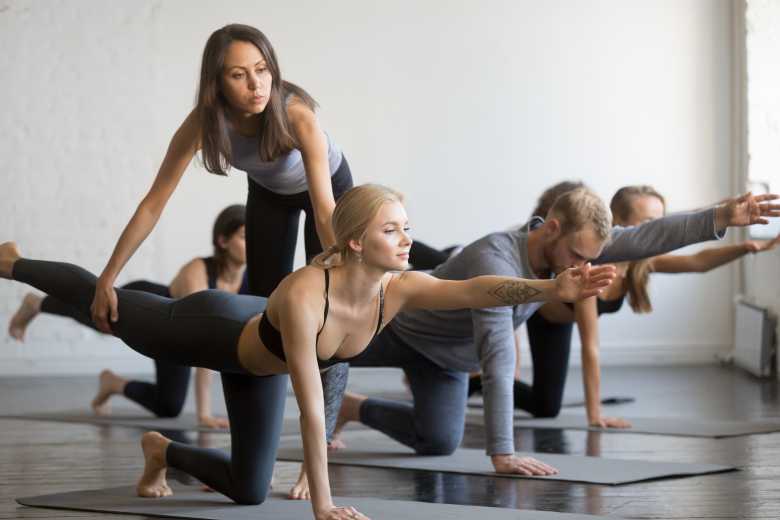
A Pilates instructor is a certified fitness professional within the delivery of the Pilates method, a low-impact exercise regime that enhances flexibility, strength, and body awareness, originally developed by Joseph Pilates in the early 20th century.
If you’re looking for a job that encompasses fitness, nutrition and health, the role of a pilates instructor could be ideal for you.
Through teaching pilates you help clients improve flexibility, posture, balance and increase muscle strength aswell helping them with their nutritional goals.
You will lead individuals or groups in Pilates exercises, carefully designing and conducting sessions that focus on correct form and alignment. Most reputable pilates qualifications have dedicated modules in nutrition planning as well as lifestyle management and health awareness.
You can find salaried pilates roles at pilates specific studios, health clubs and fitness centres, but most opportunities for pilates teachers is to freelance or set up your own business.
Progression Route: Pilates instructors can start specialising in different forms of pilates such as contemporary or reformer pilates or in areas that target a particular demographic such as pre and post natal or scoliosis. Many Pilates instructors go on to become studio managers or open their very own pilates studio.
Qualifications Required: You will need to have completed a CIMSPA recognised Level 3 qualification in Pilates in order to become a pilates instructor.
4. Nutrition Technician
Average Salary: £35,000 per year (Average of salaried roles posted on Active Careers)

Nutrition Technicians play an integral role in supporting dieticians and nutritionists and wider health care team.
As a nutrition technician you will help assess client's nutritional needs, establish goals and help track and monitor patients food intake. You will help patients by calculating their calorie needs and adjusting meal portions, record patient nutrition information, order appropriate supplements to compliment their diet plan and provide educational tips to help them reach their desired goal.
Depending on the company you work for, you might find yourself preparing and delivering nutritional workshops and seminars as well as performing basic health checks.
You need to be a good communicator to be able to breakdown complex dietary concepts into easily understandable terms for patients to fully take on board your guidance.
You can find roles working for the NHS, private medical care groups, care homes, outpatient clinics and corporate wellness brands.
Progression Route: You can progress your career through further education and become a dietician, sports nutritionist or pediatric nutritionist. Alternately, you can become a nutrition educator, Food Service Manager or Wellness manager.
Qualifications Required: This varies from employer to employer. Some companies will just require that you have covered nutrition at a Level 3 equivalent in the form of a vocational course or BTEC. Some employers however may require that you have a degree within a nutrition related field such as food science, nutritionist or food technology.
5. Corporate Wellness Coordinator
Average Salary: £28,000 per year (Average of salaried roles posted on Active Careers)

With the rise in employee welfare, the emergence of corporate wellness coordinators has been established.
Corporate wellness co-ordinators are people who are employed to look after and manage the wellbeing of employees through programmes and initiatives that are powered by the company itself.
Their primary objective is to create a healthy workplace environment where staff feel supported with both their physical and mental needs. Typically your role is to help support employees by conducting one to one sessions as well as grouped based workshops providing tailored exercise plans, stress management solutions and nutrition counselling to help them stay productive at work and prevent absenteeism.
You will work in direct connection with HR (human resources) as well as heads of department to try and drive employee engagement and morale in the right direction.
You can find these type of roles at educational establishments like universities and colleges, as well as larger corporate enterprises where their budget is less constricted than smaller companies.
Progression Route: You can work towards being a corporate wellness manager where you will manage a small team of co-ordinators or you can branch out on your own and become a wellness consultant for a number of business'.
Qualifications Required: Most corporate wellness coaches have either a degree within a nutrition or health related field like public health, kinesiology, or wellness management or have a vocational qualification in wellness coaching, nutrition, or fitness
6. Fitness & Nutrition Tutor Jobs
Average Salary: £27,000 per year (Average of salaried roles posted on Active Careers)
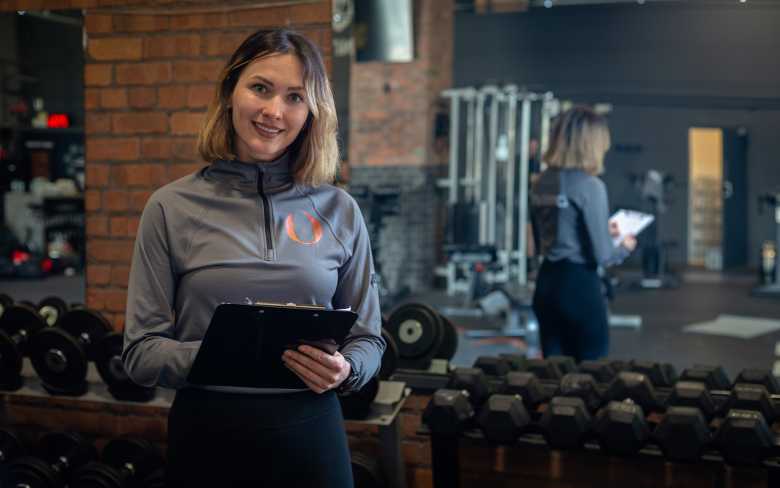
Fitness tutors and assessors are individuals that teach and assess aspiring fitness professionals and guide them through their respective qualifications.
If you want to encompass a career in nutrition and fitness that gives you real job satisfaction, being a fitness tutor could be a perfect fit for you. You could help the next generation of fitness instructors, personal trainers or nutrition coaches start their journey into the industry and get that "buzz" from seeing them go on to build their own legacies within the sector.
Many fitness tutors are qualified in multiple disciplines of fitness and health so they can teach a broad spectrum of courses and enhance their own employability and salary potential.
Most fitness and nutrition tutors work face to face in a classroom based setting and on the gym floor depending on the subject you’re leading. This said, you can find plenty of positions that are executed remotely, where you will support students digitally through webinars, online lectures and distance learning support.
Outside of your main teaching duties you will write comprehensive lesson plans to meet the lesson outcomes, mark assignments and provide constructive feedback to students.
Progression Route: The natural progression route for fitness tutors is to become a Internal Quality Assurer, which is where you assess the performance of the fitness tutors lessons plan, feedback and delivery of training.
Qualifications Required: You need to be certified in the subject you are teaching and possess a teaching qualification, such as the Level 3 Award in Education and Training. However, other regulated teaching qualifications or academic degrees are also acceptable.
Discover jobs in Outdoor Fitness and Sport
Take a look at the latest outdoor jobs in fitness and sport from all across the UK
7. Exercise Physiologist
Average Salary: £35,000 per year (Average of salaried roles posted on Active Careers)
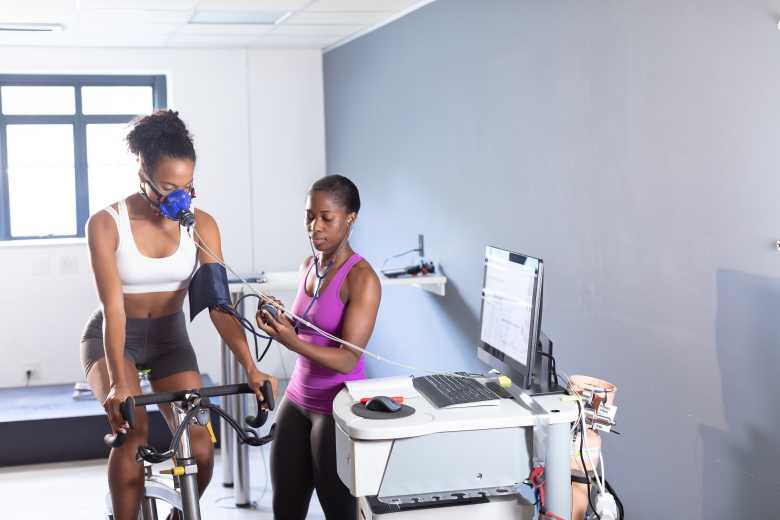
Exercise physiologists play a crucial role in helping individuals improve their overall health and quality of life through prevention and management of a variety of different illnesses such as osteoporosis, kidney disease and Musculoskeletal Disorders.
Additionally, they conduct and analyse data obtained from a variety of physiological tests of clients internal systems in order to help optimise athletes programmes so they are ready for sporting competitions.
This high paying career in nutrition and fitness is also highly rewarding as not just is it a people facing role, but it allows you to play a massive role in helping clients both mentally and physically.
Exercise physiologists work in a variety of fields from hospitals, medical centres and health care through to universities and at professional sports teams.
Whether working with patients in a clinical setting, athletes on the field, or employees in a corporate environment, exercise physiologists play a vital role in shaping a healthier society.
Qualifications required: A minimum of a bachelor's degree in exercise science, kinesiology, or a related field is typically required to become an exercise physiologist. Some positions may necessitate a master's degree for higher-level roles.
Progression Routes: You can progress into management and leadership roles and become a wellness programme manager or even a clinical director. Alternately, you can specialise in areas such as cardiac rehabilitation, sports performance or pursue roles in research or sports consulting.
8. Nutrition & Fitness Content Writer
Average Salary: £28,000 per Year (Average of salaried roles posted on Active Careers)

If you’re interested in a more unconventional way of pursuing a Career in health, fitness and nutrition with a passion for writing, the role of a fitness content writer is a dream job for some.
As a fitness content writer you’re typically tasked with creating well-researched, accurate, and engaging content for a variety of platforms such as magazines, websites, newsletters and social media.
They write articles on topics ranging from exercise routines and nutritional advice to wellness trends and fitness gear reviews, depending on the brand that you work for.
Most fitness and nutrition publishers and brands look for writers that have a strong foundation in writing and communication accompanied by a passion for fitness or nutrition.
You might work as part of a content team at a lifestyle magazine, a staff writer for a health and wellness website, or freelance between various brands within the fitness industry.
Career Progression: You can progress into editorial roles, content production manager positions, journalist or even starting your very own fitness or nutrition blog.
Qualifications Required: Although there is no direct prerequisite requirements to be a fitness and nutrition writer, brands may look for individuals with experience in a profession in health, fitness or wellness or individuals that have academic backgrounds in an english or marketing related subject.
9. Exercise Referral Specialist
Average Salary: £31,000 (Average of salaried roles posted on Active Careers)
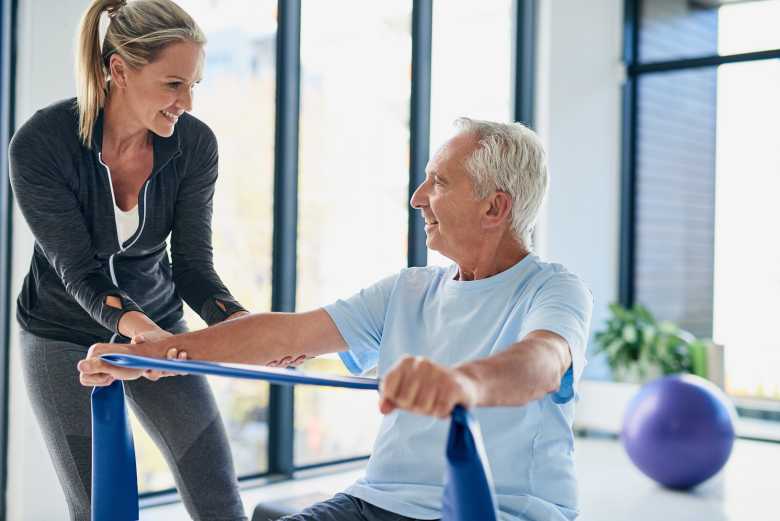
A great job to do with fitness and nutrition that you might not know about is that of an exercise referral specialist.
An exercise referral specialist role bridges the gap between the medical sector and the fitness industry by handling individuals that have been referred by healthcare professionals to combat certain medical conditions that would benefit from physical activity.
Exercise referral specialists cater to clients who have chronic health conditions or are at risk of developing them, who need a structured approach to increasing their physical activity.
You will often work with clients that have issues such as obesity, diabetes, hypertension, osteoporosis and mental health disorders to better mange their condition or help it through specific programming.
You can find roles at rehabilitation centres, wellness clinics and even some gyms specifically look for fitness professionals that are exercise referral qualified to handle clients that fall into this remit.
Career Progression: You can launch your own exercise referral business that networks with the medical sector or work at a clinic or a not for profit community initiative as a supervisor or manager.
Qualifications Required: You must at minimum have the level 2 in fitness instructing qualification and the Level 3 in Exercise Referral certificate or have completed an Exercise Referral qualification within a wider degree programme in order to apply for roles of this ilk.
10. Fitness Life Coach
Average Salary: (Average of salaried roles posted on Active Careers)

A fitness life coach is someone that evaluates your existing lifestyle habits as well as challenges you face in your personal or professional life and helps you identify ways you can improve them.
You will counsel clients through a variety of different issues depending on their obstacles and use fitness coaching and nutritional guidance to support them.
This unique career in nutrition and fitness is usually a service arm to a fitness professional or nutritional practitioner looking to expand their client services or demographic appeal.
Career Progression: Many fitness life coaches expand their business by becoming executive life coaches where you work with business owners or those with high pressured jobs or find roles as health and wellbeing coaches, well-being managers or lifestyle therapists.
Qualifications Required: To be a fitness life coach you ideally need a personal training qualification and at minimum the entry Level 1 life coaching qualification or Associate Certified Coach qualification as its also referred to.
Explore Jobs within the Wellness Industry
Want to work within the wellness industry? View all the job roles and major employers that are actively recruiting here
11. Sports Nutritionist
Average Salary: (Average of salaried roles posted on Active Careers)
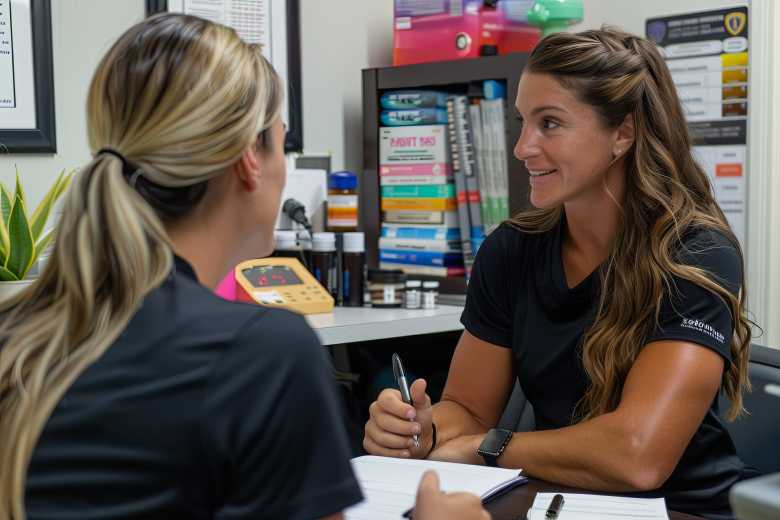
One of the highest paying careers in nutrition and fitness on this list is that of a sports nutritionist.
a sports nutritionist, a professional who plays an integral role in optimising the performance and recovery of athletes through tailored nutritional strategies.
Sports nutritionists will design and implement nutrition plans that support an athlete's training regime, performance goals, and overall health. This involves conducting detailed assessments of athletes' nutritional needs based on their sport, training schedule, body composition, and energy expenditure to produce a comprehensive meal plan that ensures optimal intake of calories and nutrients.
You can operate as a freelance sports nutritionist through your own private practice helping individual customers and athletes or elect to work for a clinic, private healthcare company, sports team or even work for a university as a researcher.
Career Progression: The next step for many junior sports nutritionist is to work independently as a consultant or work your way up to "Lead Sports Nutritionist" or "Head of Nutrition" within a sports team, educational institute or supplement brand.
Qualifications Required: To be considered for sports nutritionists roles you will need a degree in Sport Nutrition or Sports Dietician or the equivalent.
12. Yoga Teacher Jobs
Average Salary: £30,000 per year (Average of salaried roles posted on Active Careers)
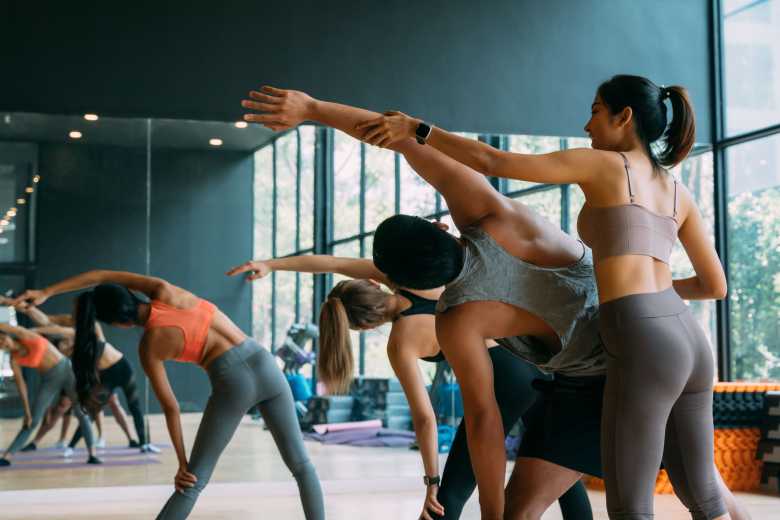
Next on our list of careers in fitness and nutrition is to follow the career path of a yoga teacher.
A yoga teacher can work both indoors and outdoors (when the weather permits) and requires very minimal equipment in which to operate.
Traditionally yoga is delivered to groups of people, guiding class attendees through sequences that includes postures, breathing exercises, meditations, and reflective practices.
Outside of classes yoga teachers support clients with nutritional guidance and plans, and give advice on how students can adapt poses based on their current ability level.
Most yoga teachers work freelance through either setting up their own yoga business from a hall, your own home or freelancing from multiple gyms and studios.
You can also specialise in different forms of yoga such as vinyasa, ashtanga or bikram yoga and in the process widen your demographic appeal and prospective earnings.
Career Progression: Progressive roles include becoming a class co-ordinator, where you determine the class structure and timetable or a Yoga Studio Manager where you will over see the smoothing running of the facility and financial performance of the business.
Qualifications Required: To get started as a yoga teacher you need to have an Ofqual regulated Level 3 Diploma in Teaching Yoga at minimum.
13. Physical Activity Specialist / Coordinator
Average Salary: £28,000 per year (Average of salaried roles posted on Active Careers)

Being a physical activity specialist is a professional dedicated to promoting and facilitating physical activity among various populations and communities to enhance their overall health and well-being.
One of their primary tasks is to develop initiatives that make physical activity accessible and appealing. This could involve organising fitness classes, outdoor activities, sports events and fitness training sessions.
Physical activity specialists often conduct workshops and seminars to educate communities including school children, adults, or the elderly about the importance of physical health and how to safely exercise.
Physical activity coordinators are employed by a variety of organisations including non for profit organisations, corporate wellness brands and government backed health initiatives.
Career Progression: You can progress your career into more senior management positions like Physical Activity Supervisor or Manager or even into helping construct the physical activity programme itself by becoming a Programme Director.
Qualifications Required: Most companies require you to hold the Level 2 in Gym Instructing for this position, with many preferring that you have either the Level 3 in Personal Training or Level 3 in Exercise Referral or a diploma in working with special populations.
14. Running Coach Positions
Average Salary: £30,000 (Average of salaried roles posted on Active Careers)

If you love running, turning your passion into your new career could be just the role that you're looking for.
Running coaches operate largely on a freelance basis, through offering one-to-one coaching services as well as sending digital running plans for clients to follow at their own leisure. You will help clients understand running intensities, frequencies and how to develop endurance and speed against their particular running discipline's requirements.
Additionally, you will provide nutritional guidance, strength training advice as well as help on client's developing good from. The client potential is huge for an aspiring running coach with running being the biggest recreational sport in the UK and the different types of running that clients can pursue from trail and fell running, through to track and just someone trying to complete their first ever park run.
This job in Nutrition and Fitness is not just limited to working independently, large running coaching businesses are always on the look out for new coaches, as well as sport centres and professional athletic bodies.
Career Progression: The most common way running coaches further their career is by diversifying the type of running coaching they offer and widening their clients base. This said, there are some opportunities to become a head coach at running specific brand or work with elite level athletes.
Qualifications Required: There are a number of running based qualifications offered by UK athletics depending on the type of running coaching you wish to target. There are ones that specialise in working with athletes, leading groups, sprinting and trail running.
15. Health educator
Average Salary: £32,000 per year (Average of salaried roles posted on Active Careers)

Health educators are instrumental in promoting healthy lifestyles and wellness through education and community engagement.
Their primary job responsibilities involve developing programmes and materials that inform people about health issues, disease prevention, and healthy habits.
This career in fitness and nutrition is suited to someone who is adept in public speaking, as much of their job involves presenting information to diverse groups and being able to convey complex health information in an understandable and relatable manner.
Many Health Educators are employed by public health departments, hospitals, and clinics, focusing on community health outreach. Others may work for non-profit organisations, schools, and private businesses, developing programmes that support the health of employees or students.
Career Progression: Many health educators go onto set-up successful businesses as health consultants, as well as moving into more senior roles within organisations as Health Education Managers, Learning Delivery Manager or Social Activity Manager.
Qualifications Required: You will need a degree in health or in an education related subject to be considered for the majority of positions. You may also be required to pass a DBS check.
16. Strength and Conditioning Coach Roles
Average Salary: £31,000 per year (Average of salaried roles posted on Active Careers)

A Strength and Conditioning (S&C) Coaches role involves enhancing an athletes sporting performance through implementing customised training plans that address specific physical requirements of that particular sport.
For example, if a basketball player wants to improve their jump shot, a strength and conditioning coach would be the professional they would seek to help them improve the physiological elements needed to improve this aspect of their game.
Strength and conditioning coaches are extensively knowledgeable on understanding the physical demands of each sport, training volumes, intensities and how to optimise these for sporting performance.
This fitness and nutrition career is highly sought after as for many the opportunity to work with high level athletes and sports teams, both amateur and professional is very appealing.
Many strength and conditioning coaches operate from specific S & C focused gyms, where the gym apparatus is geared towards this form of training. This being said, there are many ample opportunities within sports clubs, schools and also demands for freelance coaches to help amateur athletes to get an edge in their own training.
Qualifications Required: You can either obtain an Ofqual regulated Level 4 Strength and Conditioning qualification or complete a degree in Strength and Conditioning.
Progression Route: For most S & C coaching, moving up the ladder within a professional sports team to Leda / Head of Strength and Conditioning or even Director of Strength and Conditioning is the long term ambition. Alternately, opting to open your own strength and conditioning facility or providing consulting for individual athletes is a way of creating your own identity and brand.
17. PTI (Physical Training Instructor) for the MOD (Ministry of Defence)
Average Salary: £31,000 (Average of salaried roles posted on Active Careers)

An important aspect for all military personnel is to be physically fit and prepared for the possibility of being deployed for battle. This is where the role of a PTI comes into fruition.
Their job is to oversee the development and implementation of the soldiers fitness programmes, focusing on all round fitness to meet the demands their duties require. You will have to be a great motivator and leader to lead group training sessions and you will also organise sporting events and activities to drive participation and help sustain high morale.
You will provide guidance on proper exercise technique and offer advice on nutrition to ensure your regiment remain in peak physical condition and help them pass the incremental physical activity tests that they are put through.
Progression Routes: Many PTIs progress by obtaining further qualifications that are funded by the MOD such as exercise rehabilitation specialist, parachute jump instructor, or a force development instructor.
Qualifications Required: Army PTI's don't require any formal qualifications when applying for this role, however you must pass the various exams and physical fitness tests before operating as a PTI. When becoming a PTI for the RAF, they normally require that you hold a Level 3 CIMSPA recognised personal training qualification.
Ever wanted to work in Sport?
Take a look at the range of sport coaching jobs on Active Careers, from football, rugby and basketball, through to tennis and hockey.

